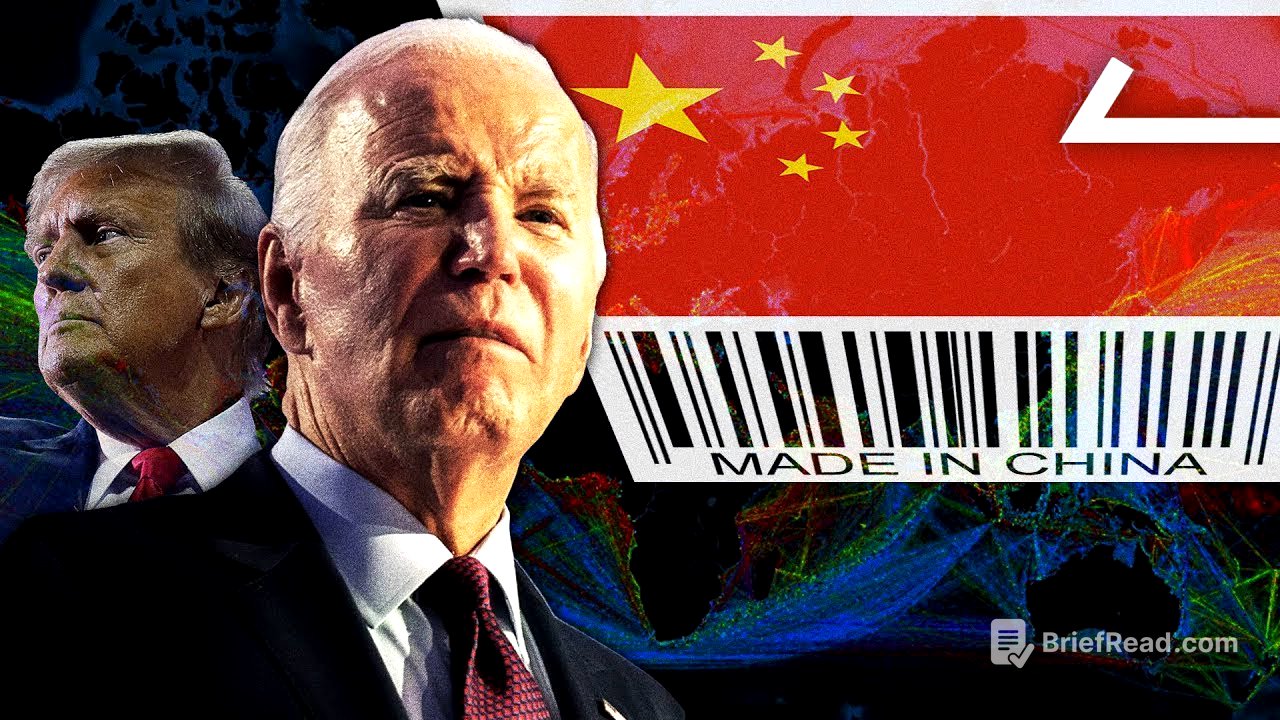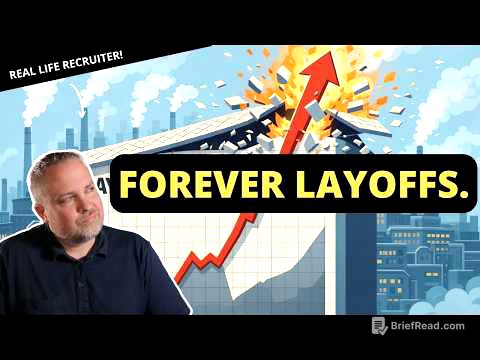TLDR;
This video discusses the shift away from the neoliberal economic consensus that has dominated American policy for the last 50 years. It examines the consequences of financialization and free trade policies, the political reaction to these trends, and the potential for a new economic paradigm under the Biden administration, which prioritizes domestic manufacturing, job creation, and investment in infrastructure and clean energy.
- The neoliberal consensus, characterized by financialization and free trade, led to job losses, wage stagnation, and a decline in the middle class's share of national income.
- The 2016 election, with critiques from both Bernie Sanders and Donald Trump, signaled a growing dissatisfaction with the status quo.
- Biden's policies represent a significant break from neoliberalism, focusing on rebuilding domestic manufacturing through strategic investments and incentives.
- The US-China trade war and targeted tariffs aim to protect American jobs and industries from unfair competition.
Intro [0:00]
The video introduces the idea that the long-standing economic consensus in the United States, defined by neoliberalism, is collapsing and being replaced by something new. It highlights a "made in America" plan to transform the American economy, driven by President Biden's policies, which represent a major shift in how the government has operated over the past 40 years. To understand this shift, the video aims to explore the ideology that has shaped the economy for the last half-century.
Financialization [1:59]
This chapter examines the rise of financialization after World War II, where unionized manufacturing jobs built the middle class. However, by the 1980s, deregulation and changes in tax policy allowed finance to take off, leading to a divergence between the fortunes of workers and companies. GE, under Jack Welch, exemplifies this shift, with massive layoffs to maximize share prices. This new paradigm prioritized financial assets over workers, innovation, and manufacturing.
Free trade [3:41]
The chapter discusses the impact of free trade agreements like NAFTA and normalized trade relations with China. While proponents argued that American consumers would benefit from cheaper goods, the US lost around 700,000 jobs from NAFTA. The entry of China into the World Trade Organization led to a flood of Chinese exports, causing the loss of over 5 million manufacturing jobs between 1998 and 2021. This outsourcing of the industrial base was exchanged for cheap goods, leading to the decline of communities.
The neoliberal bargain [6:05]
This section describes the "neoliberal bargain" where the US outsourced its industrial base in exchange for cheap goods. While share prices went up and consumer prices went down, the middle class saw its share of national income decline. The cost of essential services like education, healthcare, and housing rose, creating a cost of living crisis despite the availability of cheap consumer goods.
2016 election [7:11]
The 2016 election, where both Bernie Sanders and Donald Trump critiqued the mainstream view, served as a wake-up call for policymakers in Washington. Trump initiated a trade war, arguing that the US had already lost due to leaders not taking care of American people and companies. While Trump's administration lacked a policy prescription for the US, a more ambitious plan was being developed elsewhere.
Biden’s radical world view [8:33]
This chapter introduces Biden's new philosophy of growth, which aims to reward work, not just wealth. This approach, sometimes called "Bidenomics," signals a move towards a post-neoliberal world. Biden prioritizes jobs, incomes, and communities, aiming to rebuild the backbone of America through manufacturing, unions, and the middle class.
Biden’s policies [9:20]
The Biden Administration has translated its worldview into multi-trillion dollar policies, including the bipartisan infrastructure law, the Inflation Reduction Act, and the CHIPS and Science Act. These investments in manufacturing and construction are flowing disproportionately to areas with high unemployment. The goal is to invest in real places with real workers, creating well-paid jobs with good benefits. The investment tax credit encourages companies to invest in clean energy, pay prevailing wages, run apprenticeship programs, and use made-in-America supply chains.
US-China trade war [12:27]
This section discusses the US-China trade war, with the US accusing China of "dumping" goods at artificially low prices. The concern is that importing the lowest-cost products will undermine labor standards and the US economy. Biden has kept Trump's tariffs in place and announced new tariffs on Chinese goods, targeting sectors where the US is investing at home, such as steel, semiconductors, and clean energy. The goal is to protect American jobs from cheaper imports.
Conclusion [14:06]
The video concludes by noting that the shift from neoliberalism will take many years. Biden's new economic worldview has not been at the center of most political coverage, but there is a coherent policy experiment happening. The future of the American economy will depend on whether voters choose to continue this experiment. While Trump broke with neoliberalism on trade, Biden is changing the neoliberal consensus by prioritizing workers and communities.









